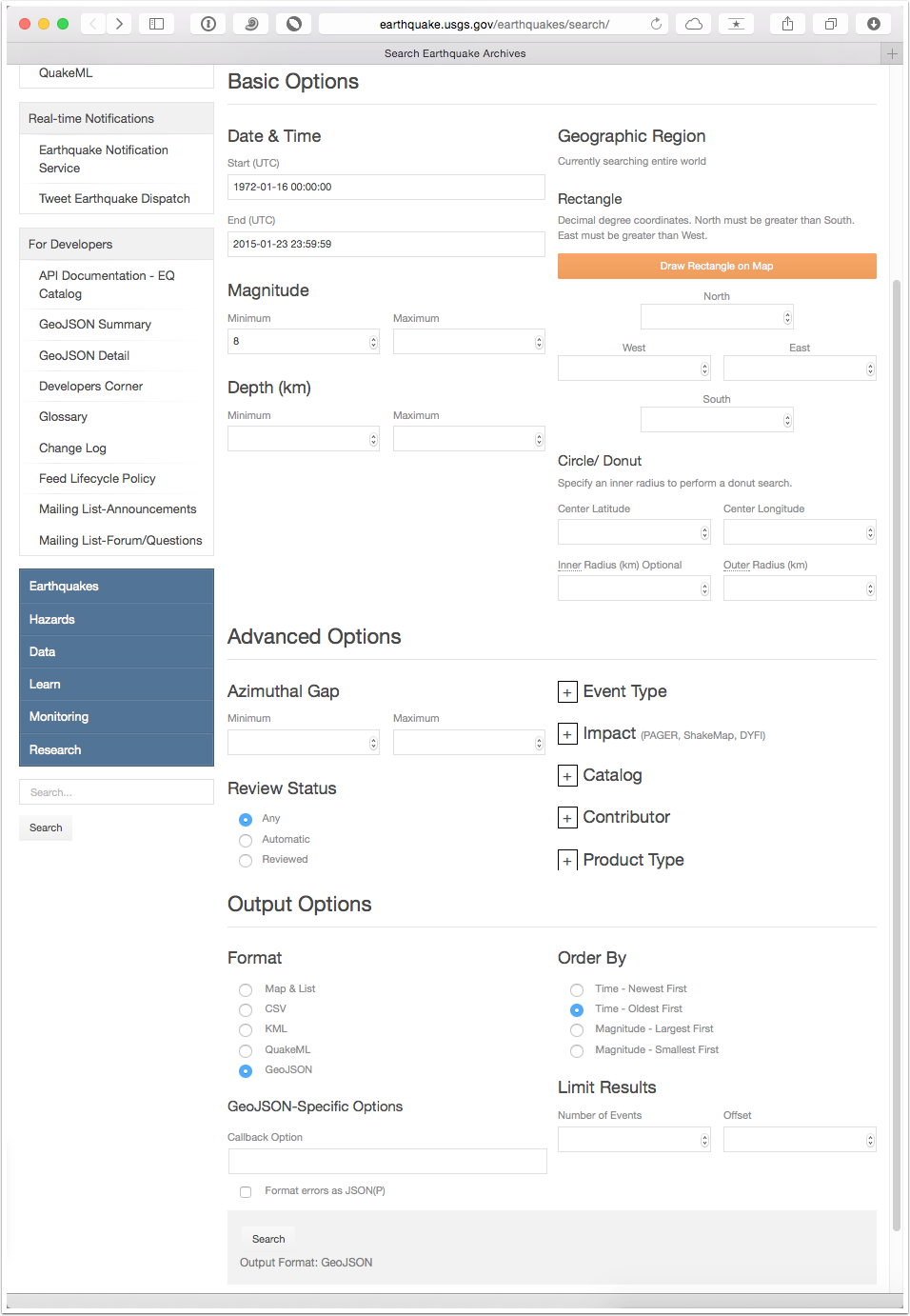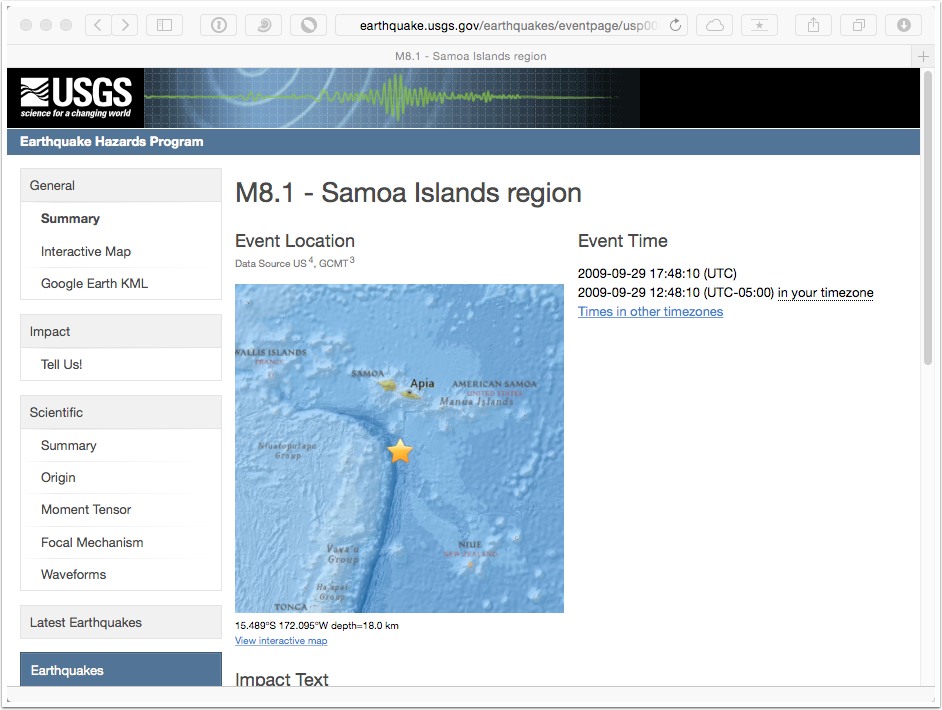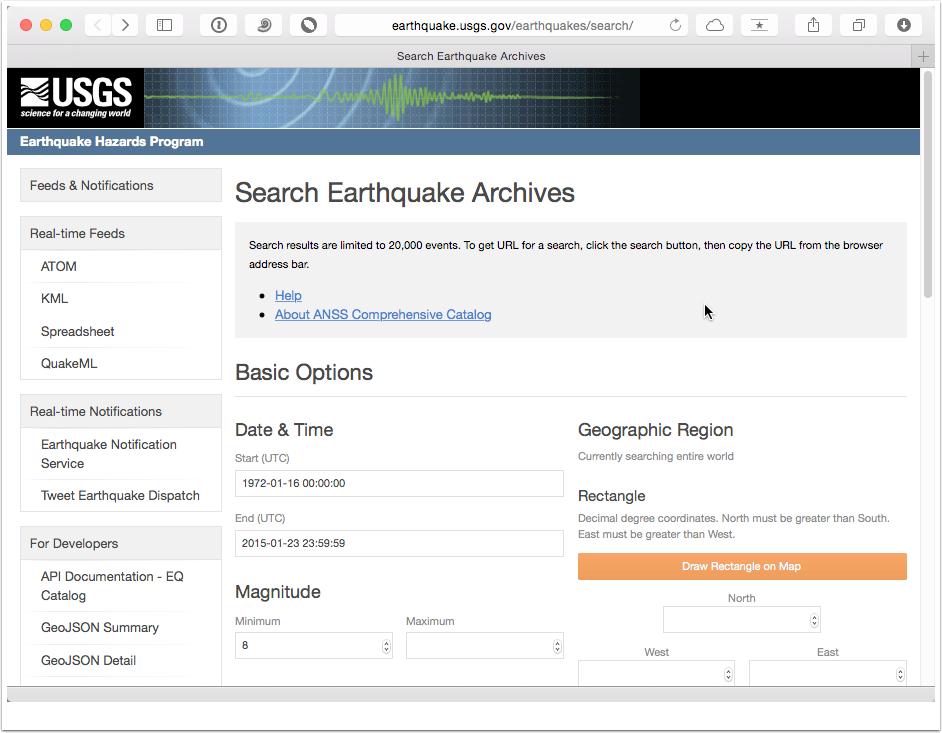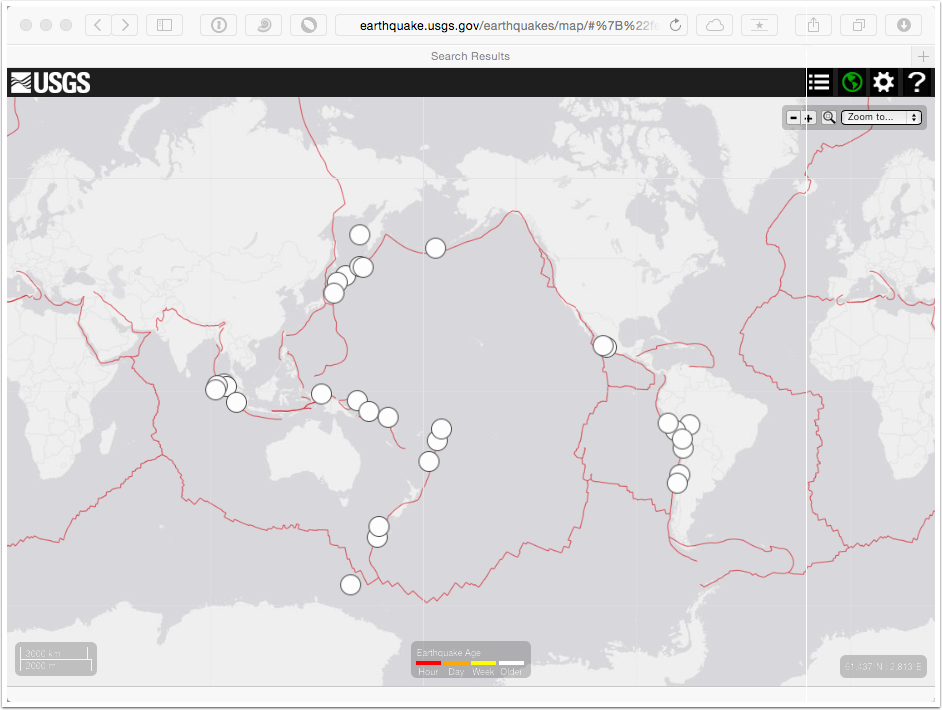Usgs Earthquake Catalog
Usgs Earthquake Catalog - Earthquake catalog for estimation of maximum earthquake magnitude, central and eastern united states: Display event dates and times using this time zone. Expand advanced options and fill in the circle fields. Usgs earthquake hazards program, responsible for monitoring, reporting, and researching earthquakes and earthquake hazards Find recent or historic earthquakes, lists, information on selected significant earthquakes, earthquake resources by state, or find webservices. Currently to make geodetic observations the usgs uses the global positioning system (gps) and also other techniques. Hypocenters, magnitudes, phase picks and amplitudes) and other products (e.g. (creepmeters, tiltmeters, strainmeters, magnetometers, pore pressure monitors). A new catalog is assembled from several pre‐existing catalogs. We describe a methodology that has been developed at the u.s. Usgs earthquake hazards program, responsible for monitoring, reporting, and researching earthquakes and earthquake hazards Earthquake catalog for estimation of maximum earthquake magnitude, central and eastern united states: Expand advanced options and fill in the circle fields. The anss comprehensive earthquake catalog (comcat) contains earthquake source parameters (e.g. Geological survey for making earthquake catalogs for seismic hazard analysis and review the status of the catalogs for the conterminous united states. Currently to make geodetic observations the usgs uses the global positioning system (gps) and also other techniques. (creepmeters, tiltmeters, strainmeters, magnetometers, pore pressure monitors). Hypocenters, magnitudes, phase picks and amplitudes) and other products (e.g. Display event dates and times using this time zone. Search earthquake catalog time zone. We describe a methodology that has been developed at the u.s. Currently to make geodetic observations the usgs uses the global positioning system (gps) and also other techniques. The anss comprehensive earthquake catalog (comcat) contains earthquake source parameters (e.g. Usgs earthquake hazards program, responsible for monitoring, reporting, and researching earthquakes and earthquake hazards Hypocenters, magnitudes, phase picks and amplitudes) and. Currently to make geodetic observations the usgs uses the global positioning system (gps) and also other techniques. Earthquake catalog for estimation of maximum earthquake magnitude, central and eastern united states: Search earthquake catalog time zone. Use the earthquake catalog search to find earthquakes within a certain distance of any location. Geological survey for making earthquake catalogs for seismic hazard analysis. (creepmeters, tiltmeters, strainmeters, magnetometers, pore pressure monitors). Currently to make geodetic observations the usgs uses the global positioning system (gps) and also other techniques. Search earthquake catalog time zone. Earthquake catalog for estimation of maximum earthquake magnitude, central and eastern united states: Geological survey for making earthquake catalogs for seismic hazard analysis and review the status of the catalogs for. Currently to make geodetic observations the usgs uses the global positioning system (gps) and also other techniques. Find recent or historic earthquakes, lists, information on selected significant earthquakes, earthquake resources by state, or find webservices. Search earthquake catalog time zone. Usgs earthquake hazards program, responsible for monitoring, reporting, and researching earthquakes and earthquake hazards Moment tensor solutions, macroseismic information, tectonic. The anss comprehensive earthquake catalog (comcat) contains earthquake source parameters (e.g. Usgs earthquake hazards program, responsible for monitoring, reporting, and researching earthquakes and earthquake hazards Find recent or historic earthquakes, lists, information on selected significant earthquakes, earthquake resources by state, or find webservices. Moment tensor solutions, macroseismic information, tectonic summaries, maps) produced by contributing seismic networks. A new catalog is. We describe a methodology that has been developed at the u.s. (creepmeters, tiltmeters, strainmeters, magnetometers, pore pressure monitors). Earthquake catalog for estimation of maximum earthquake magnitude, central and eastern united states: Moment tensor solutions, macroseismic information, tectonic summaries, maps) produced by contributing seismic networks. A new catalog is assembled from several pre‐existing catalogs. Usgs earthquake hazards program, responsible for monitoring, reporting, and researching earthquakes and earthquake hazards Use the earthquake catalog search to find earthquakes within a certain distance of any location. Geological survey for making earthquake catalogs for seismic hazard analysis and review the status of the catalogs for the conterminous united states. Earthquake catalog for estimation of maximum earthquake magnitude, central. Find recent or historic earthquakes, lists, information on selected significant earthquakes, earthquake resources by state, or find webservices. Earthquake catalog for estimation of maximum earthquake magnitude, central and eastern united states: Moment tensor solutions, macroseismic information, tectonic summaries, maps) produced by contributing seismic networks. Expand advanced options and fill in the circle fields. Search earthquake catalog time zone. Hypocenters, magnitudes, phase picks and amplitudes) and other products (e.g. (creepmeters, tiltmeters, strainmeters, magnetometers, pore pressure monitors). Currently to make geodetic observations the usgs uses the global positioning system (gps) and also other techniques. Earthquake catalog for estimation of maximum earthquake magnitude, central and eastern united states: Geological survey for making earthquake catalogs for seismic hazard analysis and review the. Hypocenters, magnitudes, phase picks and amplitudes) and other products (e.g. Expand advanced options and fill in the circle fields. Find recent or historic earthquakes, lists, information on selected significant earthquakes, earthquake resources by state, or find webservices. Moment tensor solutions, macroseismic information, tectonic summaries, maps) produced by contributing seismic networks. Usgs earthquake hazards program, responsible for monitoring, reporting, and researching. Earthquake catalog for estimation of maximum earthquake magnitude, central and eastern united states: The anss comprehensive earthquake catalog (comcat) contains earthquake source parameters (e.g. Moment tensor solutions, macroseismic information, tectonic summaries, maps) produced by contributing seismic networks. (creepmeters, tiltmeters, strainmeters, magnetometers, pore pressure monitors). Search earthquake catalog time zone. A new catalog is assembled from several pre‐existing catalogs. Use the earthquake catalog search to find earthquakes within a certain distance of any location. Moment tensor solutions, macroseismic information, tectonic summaries, maps) produced by contributing seismic networks. Usgs earthquake hazards program, responsible for monitoring, reporting, and researching earthquakes and earthquake hazards Find recent or historic earthquakes, lists, information on selected significant earthquakes, earthquake resources by state, or find webservices. Display event dates and times using this time zone. The anss comprehensive earthquake catalog (comcat) contains earthquake source parameters (e.g. Geological survey for making earthquake catalogs for seismic hazard analysis and review the status of the catalogs for the conterminous united states. Expand advanced options and fill in the circle fields.CEUS Seismicity for earthquakes Mw >=2.5 since 1700. USGS 2014 Seismic
Search the USGS Earthquake Catalog
Search the USGS Earthquake Catalog
Search the USGS Earthquake Catalog
Seismic data from https//earthquake.usgs.gov/data/centennial
Fig. S1 . Regional historical seismicity maps (a) USGS/NEIC catalog
Map of the study area. The red star represents the location of the
12 U.S.G.S. Earthquake catalog of 2010 (a) Magnitude and date of M ≥ 5
Search the USGS Earthquake Catalog
United States Geological Survey (USGS) Earthquake Catalogue APDIM
We Describe A Methodology That Has Been Developed At The U.s.
Hypocenters, Magnitudes, Phase Picks And Amplitudes) And Other Products (E.g.
Currently To Make Geodetic Observations The Usgs Uses The Global Positioning System (Gps) And Also Other Techniques.
Hypocenters, Magnitudes, Phase Picks And Amplitudes) And Other Products (E.g.
Related Post:








